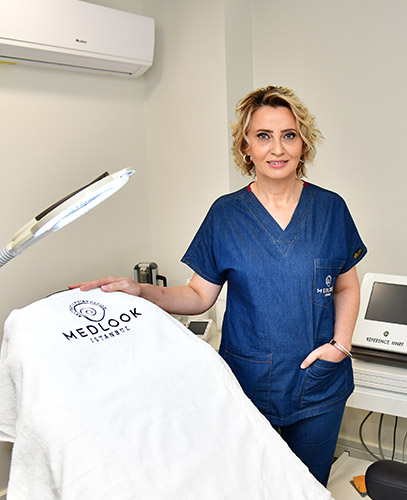
Hair Loss During Menopause is a natural phase in a woman’s life that brings about significant hormonal changes, often leading to various physical symptoms, including hair loss. For many women, this can be a distressing experience, impacting their self-esteem and overall well-being.
At Istanbul Hair Institute, we are dedicated to helping women understand the causes of menopausal hair loss and providing effective treatments and solutions to restore their hair and confidence.
Understanding Menopause and Hair Loss
Menopause marks the end of a woman’s menstrual cycles and typically occurs between the ages of 45 and 55. This transition is characterized by a decline in hormone levels, particularly estrogen and progesterone, which can have a profound effect on various bodily functions, including hair growth.
Hormonal Impact:
- Estrogen and Progesterone: These hormones play a crucial role in maintaining hair growth. During menopause, their decreased levels can lead to hair thinning and increased hair shedding.
- Androgens: While estrogen levels drop, androgens (male hormones) remain relatively constant. This imbalance can cause hair follicles to shrink, leading to thinner hair and potential hair loss.
Common Patterns of Hair Loss:
- Diffuse Thinning: Many women experience diffuse thinning across the scalp, where hair gradually becomes thinner but doesn’t necessarily fall out in patches.
- Receding Hairline: Some women may notice a receding hairline, similar to male pattern baldness, though this is less common.
- Bald Spots: In some cases, women may develop small bald spots, particularly at the crown of the head.
Emotional and Psychological Effects:
- Self-Esteem: Hair loss can significantly impact a woman’s self-esteem and confidence. It’s important to address these emotional aspects alongside physical treatments.
- Mental Health: The stress and anxiety associated with hair loss can contribute to a cycle of worsening hair health. Managing stress and seeking support are crucial steps in the treatment process.
At Istanbul Hair Institute, we understand the multifaceted nature of hair loss during menopause and offer comprehensive solutions to help women regain their hair and confidence.
Causes of Hair Loss During Menopause
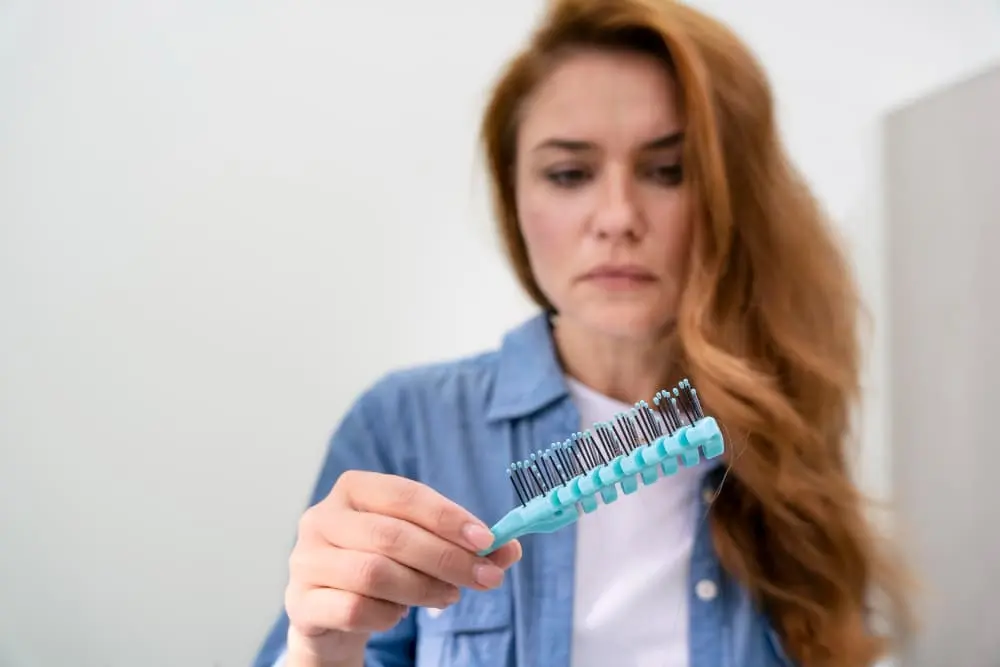
Hair loss during menopause can be attributed to several key factors. Understanding these causes can help in developing effective treatment strategies.
Hormonal Imbalance:
- Decrease in Estrogen and Progesterone: The decline in estrogen and progesterone levels during menopause is a primary cause of hair thinning and loss. These hormones help hair grow faster and stay on the head longer. When their levels drop, hair growth slows, and hair loss increases.
- Increase in Androgens: While estrogen and progesterone levels decrease, androgens (male hormones) can become more active. This hormonal imbalance can cause hair follicles to shrink, leading to hair thinning and loss, particularly in areas where hair is typically thicker.
Genetic Predisposition:
- Family History: Genetics play a significant role in hair loss. If other women in your family have experienced hair loss during menopause, you are more likely to experience it as well.
Stress and Lifestyle Factors:
- Physical and Emotional Stress: Menopause can be a stressful time, both physically and emotionally. Stress can exacerbate hair loss by increasing the levels of androgens in the body.
- Poor Nutrition: A diet lacking in essential vitamins and minerals can contribute to hair loss. Nutrients such as iron, vitamin D, and biotin are crucial for maintaining healthy hair.
Medical Conditions and Medications:
- Thyroid Issues: Menopause can sometimes trigger thyroid problems, which can lead to hair loss. Hypothyroidism and hyperthyroidism both affect hair health.
- Medications: Certain medications taken during menopause, such as hormone replacement therapy (HRT) and treatments for other menopausal symptoms, can have side effects that include hair loss.
Aging:
- Natural Aging Process: As part of the natural aging process, hair growth slows, and hair follicles may stop producing new hair altogether. This is independent of hormonal changes and contributes to hair thinning over time.
By understanding these causes, women can take a proactive approach to managing hair loss during menopause. At Istanbul Hair Institute, we offer personalized consultations to identify the specific causes of hair loss and develop tailored treatment plans.
Signs and Symptoms of Menopausal Hair Loss
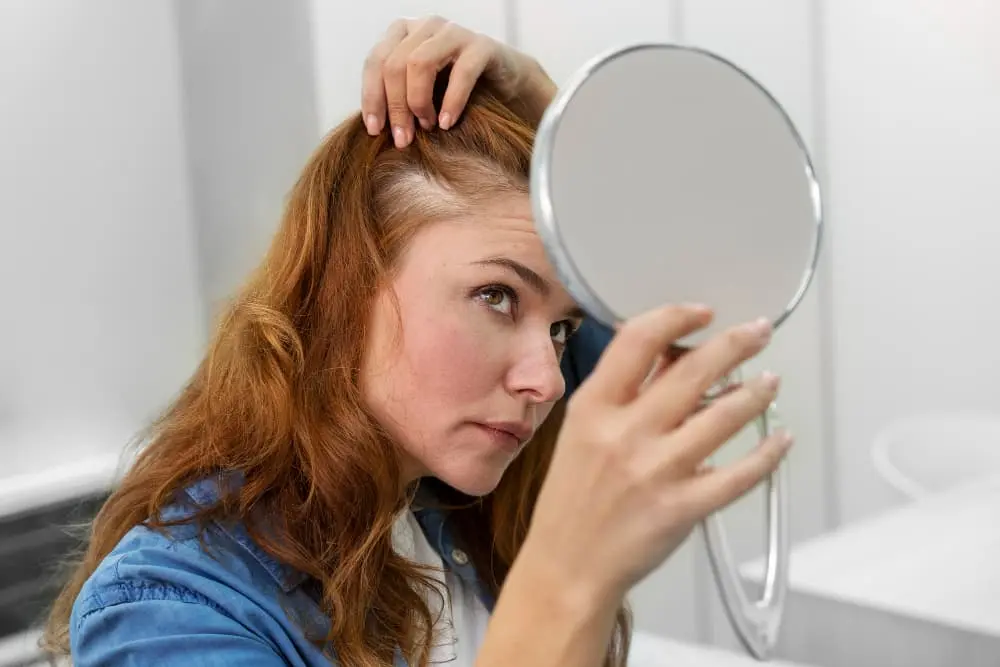
Recognizing the signs and symptoms of menopausal hair loss is crucial for early intervention and effective treatment. Here are the key indicators to look out for:
Thinning Hair:
- Overall Volume Reduction: One of the most common symptoms is a noticeable reduction in hair volume. Hair may feel and look thinner, particularly around the crown and top of the head.
- Widening Part: Many women notice their part becoming wider, which can indicate thinning hair.
Increased Hair Shedding:
- Hair in the Brush: Finding more hair in your brush or comb than usual can be a sign of increased shedding. It’s normal to lose some hair daily, but a significant increase can indicate a problem.
- Hair in the Shower: Seeing more hair than usual in the shower drain can also be a sign of menopausal hair loss.
Change in Hair Texture:
- Dry and Brittle Hair: Hormonal changes can affect the texture of your hair, making it dry, brittle, and more prone to breakage.
- Lack of Shine: Hair may appear dull and lack the natural shine it once had.
Bald Spots and Patches:
- Small Bald Patches: Some women may develop small bald spots, especially on the crown or at the temples.
- Overall Thinning: While complete baldness is rare, significant thinning can occur, making the scalp more visible.
Receding Hairline:
- Front and Temples: A receding hairline, particularly around the front and temples, is less common but can occur in some women during menopause.
Psychological Impact:
- Low Self-Esteem: Hair loss can lead to decreased self-esteem and confidence.
- Increased Stress and Anxiety: Worrying about hair loss can contribute to a cycle of stress and further hair thinning.
Identifying these signs and symptoms early can help you seek timely treatment and prevent further hair loss. At Istanbul Hair Institute, we offer comprehensive evaluations to determine the extent of hair loss and provide effective solutions tailored to your needs.
Hormonal Changes and Their Impact on Hair

During menopause, hormonal changes significantly impact hair health. The decline in estrogen and progesterone levels is a primary cause of hair thinning and shedding. These hormones are essential for maintaining hair growth and keeping hair in the anagen (growth) phase. As their levels drop, hair growth slows, and the growth phase shortens, resulting in thinner hair and increased shedding.
Another critical factor is the increase in androgens. While estrogen and progesterone decrease, male hormones like testosterone remain relatively constant. This hormonal imbalance can cause hair follicles to shrink. Dihydrotestosterone (DHT), a byproduct of testosterone, is particularly potent in miniaturizing hair follicles. This leads to thinner, weaker hair strands and eventual hair loss, especially in women genetically predisposed to androgenetic alopecia.
Hormonal fluctuations also include increased levels of cortisol, the stress hormone, which can exacerbate hair loss. Stress-induced hair loss, known as telogen effluvium, causes hair to fall out more readily. Additionally, menopause can affect thyroid function, leading to conditions like hypothyroidism or hyperthyroidism, both of which negatively impact hair health and contribute to thinning.
Effects on Hair Texture:
- Dry and Brittle Hair: Hormonal changes can reduce the natural oils produced by sebaceous glands, making hair dry and brittle.
- Disrupted Hair Growth Cycle: More hair follicles may enter the telogen (resting) phase prematurely, leading to increased shedding and slower regrowth.
Management and Treatment:
- Hormone Replacement Therapy (HRT): Balancing hormone levels through HRT can help mitigate hair loss but should be discussed with a healthcare provider due to potential risks.
- Topical Treatments: Products containing procapil, saw pall metto, niasin can stimulate hair growth by prolonging the anagen phase of the hair cycle.
- Home Mesotherapies: Products containing peptites, vitamin, minerals, grow factors can stop hairloss and support hair growth
- LLLT: Low-level laser (light) therapy can improves hair loss by promoting new vessel formation and blood circulation
- Diet and Supplements: Ensuring a diet rich in essential vitamins and minerals, such as biotin, iron, and vitamin D, supports hair health during menopause.
At Istanbul Hair Institute, we understand the complex role hormones play in hair loss during menopause. Our experts provide personalized consultations to assess hormonal impacts and develop effective, tailored treatment plans.
Non-Surgical Treatments for Menopausal Hair Loss
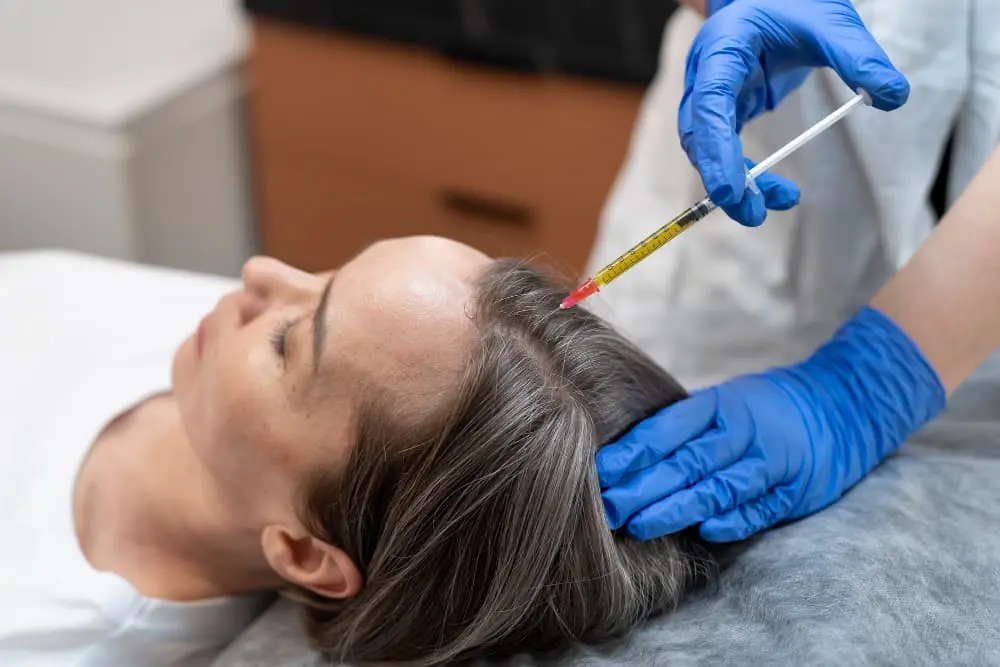
Managing hair loss during menopause doesn’t always require surgical intervention. At Istanbul Hair Institute, we offer several effective non-surgical treatments to help mitigate hair thinning and promote healthy hair growth:
- PRP Treatment: Platelet-Rich Plasma (PRP) therapy involves using a concentration of a patient’s own platelets to accelerate hair growth and improve hair density.
- Mesotherapy Treatment: This involves injecting a mixture of vitamins, minerals, and amino acids directly into the scalp to nourish hair follicles and promote hair growth.
- Stem Cell Treatment: Stem cell therapy uses the regenerative properties of stem cells to stimulate hair growth and improve the health of hair follicles.
- Indirect Stem Cells Treatment: This method involves using stem cell-derived products to enhance hair growth and improve scalp health.
- Full Hair Check-Up: Comprehensive assessments to determine the underlying causes of hair loss and develop a personalized treatment plan.
These treatments provide a variety of options to address hair loss during menopause, ensuring a comprehensive approach to hair restoration.
Hair Transplant Solutions for Menopausal Women
For women experiencing significant hair loss during menopause, hair transplant procedures offer a permanent and effective solution. At Istanbul Hair Institute, we specialize in advanced hair restoration techniques tailored to the unique needs of menopausal women.
Menopause can be an ideal time for hair transplants as hormonal fluctuations stabilize, providing a more predictable environment for hair growth. This stability allows for better planning and successful outcomes in hair restoration treatments.
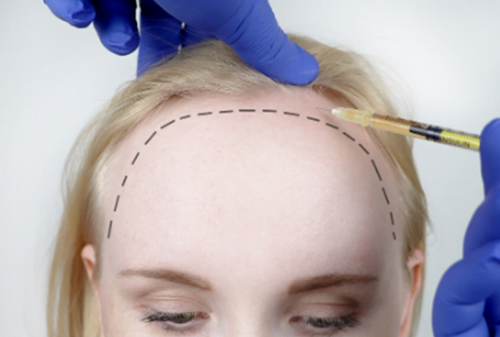
Follicular Unit Extraction (FUE):
- Minimally Invasive: FUE involves extracting individual hair follicles from the donor area, usually the back of the scalp, and transplanting them to the thinning or balding areas.
- Natural Results: This technique ensures that the transplanted hair blends seamlessly with your natural hair, providing a natural and fuller appearance. FUE is known for its minimal scarring and quick recovery time.
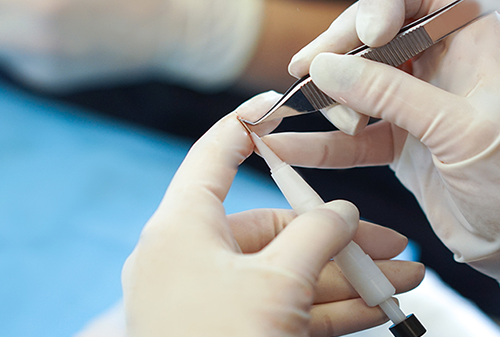
Direct Hair Implantation (DHI):
- Precision and Control: DHI is a refined version of FUE that uses a specialized tool to directly implant hair follicles into the scalp. This method allows for precise control over the depth, direction, and angle of each hair follicle.
- Enhanced Density: DHI is particularly effective for achieving high-density hair restoration, making it ideal for women with advanced hair thinning. The precision of DHI results in a more natural look and feel.
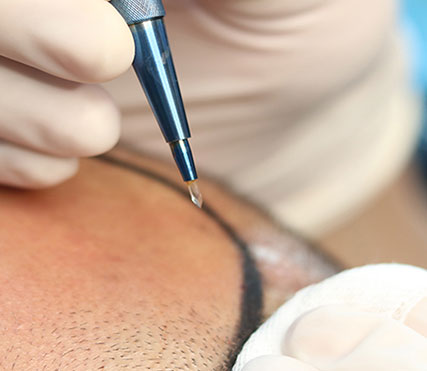
- Precision and Control: Sapphire FUE is an advanced version of the FUE technique that uses sapphire blades instead of steel. This allows for more precise incisions, minimizing tissue damage and promoting quicker healing.
- Natural Results: The use of sapphire blades results in finer incisions, which allows for higher graft density and a more natural-looking hairline. This technique is ideal for individuals seeking a seamless and natural appearance.
- Enhanced Healing: Sapphire blades cause less trauma to the scalp, resulting in faster recovery times and reduced risk of complications.
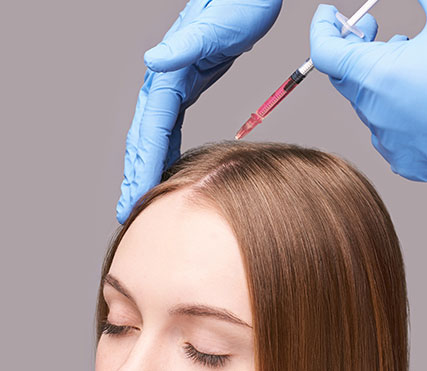
Stem Cell Supported Hair Transplant
- Enhanced Regeneration: Stem Cell Supported Hair Transplant utilizes the regenerative properties of stem cells to enhance hair growth and improve follicle health. This method involves harvesting stem cells from the patient’s own body and injecting them into the scalp.
- Boosted Results: By integrating stem cells with traditional hair transplant techniques, this approach accelerates healing and stimulates the growth of stronger, healthier hair. It is especially effective for individuals with significant hair thinning, offering a fuller and more natural look.
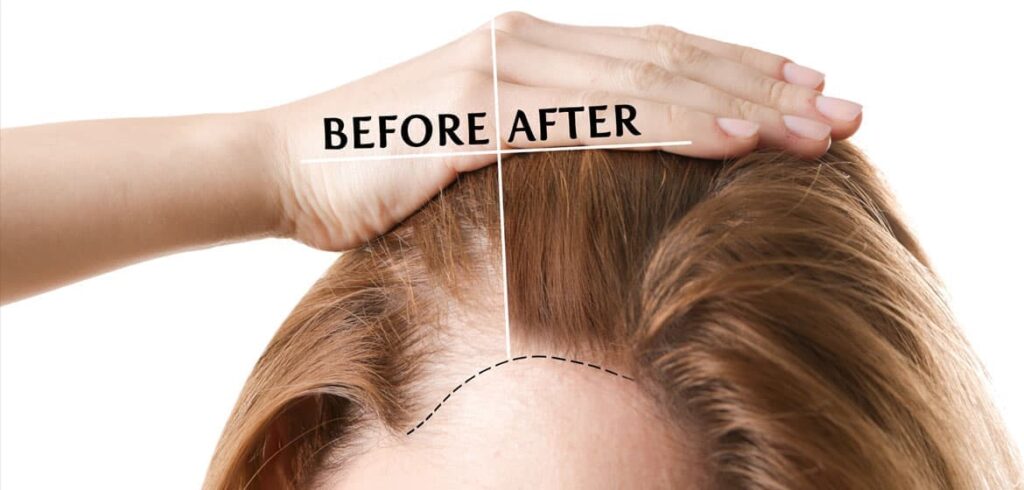
Customized Treatment Plans:
- Personalized Consultations: Every woman’s hair loss pattern and condition are unique. At Istanbul Hair Institute, we offer personalized consultations to assess your specific needs and develop a tailored treatment plan.
- Detailed Evaluations: Our experts conduct thorough evaluations to determine the best approach, considering factors such as hair density, donor hair quality, and overall health.
Advanced Technology and Techniques:
- Latest Innovations: We utilize the latest advancements in hair transplant technology to ensure optimal outcomes. Our state-of-the-art equipment and techniques provide superior results with minimal discomfort.
- Experienced Surgeons: Our team of skilled doctors has extensive experience in performing hair transplants for women, ensuring that each procedure is carried out with the highest level of expertise and care.
Comprehensive Aftercare:
- Post-Operative Support: Successful hair restoration doesn’t end with the procedure. We provide comprehensive aftercare to monitor your progress and ensure the best possible healing and hair growth.
- Ongoing Guidance: Our team offers continuous support and guidance on hair care and maintenance post-transplant, helping you maintain and enhance your new hair.
Natural and Lasting Results:
- Permanent Solution: Hair transplants offer a permanent solution to hair loss, with transplanted hair continuing to grow naturally over time.
- Boosted Confidence: Restoring your hair can significantly improve your self-esteem and quality of life. At Istanbul Hair Institute, we aim to help you regain your confidence with natural-looking results.
Choosing a hair transplant at Istanbul Hair Institute ensures that you receive the best care and expertise available.
Why Choose Istanbul for Your Hair Restoration?

Istanbul has become a top destination for hair restoration, drawing patients from around the world. One of the main reasons is the presence of highly skilled hair transplant doctors. At Istanbul Hair Institute, our team is renowned for its expertise and high success rates. Our doctors are dedicated to continuously updating their skills with the latest advancements in hair restoration techniques, ensuring you receive the best care possible.
The modern facilities in Istanbul are another major draw. Clinics like Istanbul Hair Institute are equipped with state-of-the-art technology and adhere to international standards, providing a safe and comfortable environment for all patients. Our use of cutting-edge hair transplant methods, such as Follicular Unit Extraction (FUE), Direct Hair Implantation (DHI) and stem cell supported hair transplant, ensures natural-looking results with minimal scarring and quick recovery times.
Affordability is also a significant factor. Hair transplant procedures in Istanbul are much more affordable compared to many Western countries. This cost-effectiveness allows you to receive top-tier treatment without the high price tag, offering excellent value for your investment. Despite the lower costs, the quality of care and outcomes remain exceptionally high.
Personalized care is a cornerstone of our approach at Istanbul Hair Institute. We develop customized treatment plans tailored to your specific needs and goals. From the initial consultation to post-operative care, our dedicated team ensures that you receive the best possible care throughout your hair restoration journey.
Comprehensive aftercare is crucial for successful hair restoration, and we provide thorough support to monitor your progress and ensure optimal healing and hair growth. Our team offers continuous guidance on hair care, helping you maintain and enhance your new hair.
Finally, Istanbul offers a unique cultural experience. While undergoing your hair restoration treatment, you can explore the rich cultural heritage, vibrant markets, and exquisite cuisine that Istanbul has to offer, making your medical trip both effective and enjoyable.
Choosing Istanbul Hair Institute for your hair restoration means opting for expertise, advanced technology, personalized care, and an enriching cultural experience. We are committed to helping you achieve natural, lasting results that enhance your appearance and boost your confidence.
Istanbul Hair Institute: Your Partner in Hair Restoration

At Istanbul Hair Institute, we provide exceptional hair restoration services tailored to each patient’s unique needs. Our commitment to excellence and personalized care makes us a trusted partner in your hair restoration journey.
Our team of highly skilled surgeons uses advanced techniques such as Follicular Unit Extraction (FUE) and Direct Hair Implantation (DHI) to ensure natural-looking results with minimal scarring and quick recovery times. We utilize the latest technology for precision and effectiveness in every procedure.
Personalized care is key to successful hair restoration. Each patient receives a thorough consultation and a customized treatment plan. This approach ensures the most effective treatment for your unique needs.
Our commitment extends beyond the procedure with comprehensive aftercare. We provide ongoing support to monitor progress and ensure optimal healing and hair growth, offering guidance on hair care and maintenance.
Choosing Istanbul Hair Institute means trusting your hair and confidence to a team dedicated to excellence. Our focus on advanced techniques, personalized treatment, and comprehensive care ensures natural, lasting results.
We serve patients worldwide, offering exceptional medical care in a welcoming environment. Our multilingual staff ensures a smooth and comfortable experience from consultation to post-operative care.
At Istanbul Hair Institute, we are more than just a clinic – we are your partners in hair restoration, committed to helping you regain your confidence and enhance your appearance.
Recent Posts
-
 Does Creatine Cause Hair Loss? Separating Fact from Fiction21 Jan 2025
Does Creatine Cause Hair Loss? Separating Fact from Fiction21 Jan 2025 -
 How Long Does Hair Transplant Last? A Comprehensive Guide to Long-Term Results15 Jan 2025
How Long Does Hair Transplant Last? A Comprehensive Guide to Long-Term Results15 Jan 2025 -
 Hair Loss After Hair Transplantation: Is It Normal and What to Do?13 Jan 2025
Hair Loss After Hair Transplantation: Is It Normal and What to Do?13 Jan 2025 -
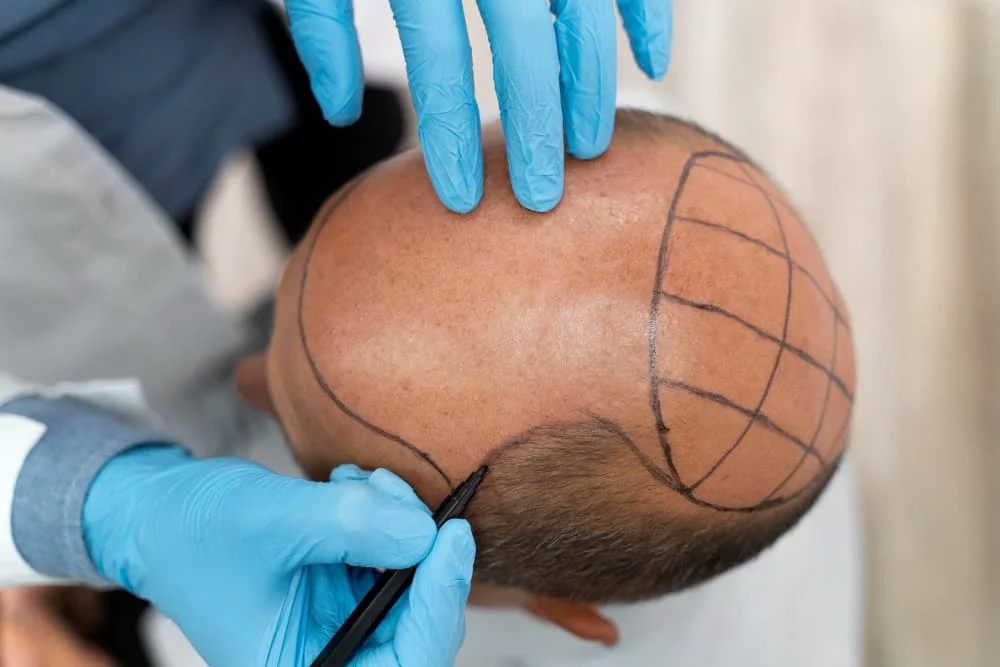 Donor Area in Hair Transplant: All You Need to Know - Istanbul Hair Institute06 Jan 2025
Donor Area in Hair Transplant: All You Need to Know - Istanbul Hair Institute06 Jan 2025 -
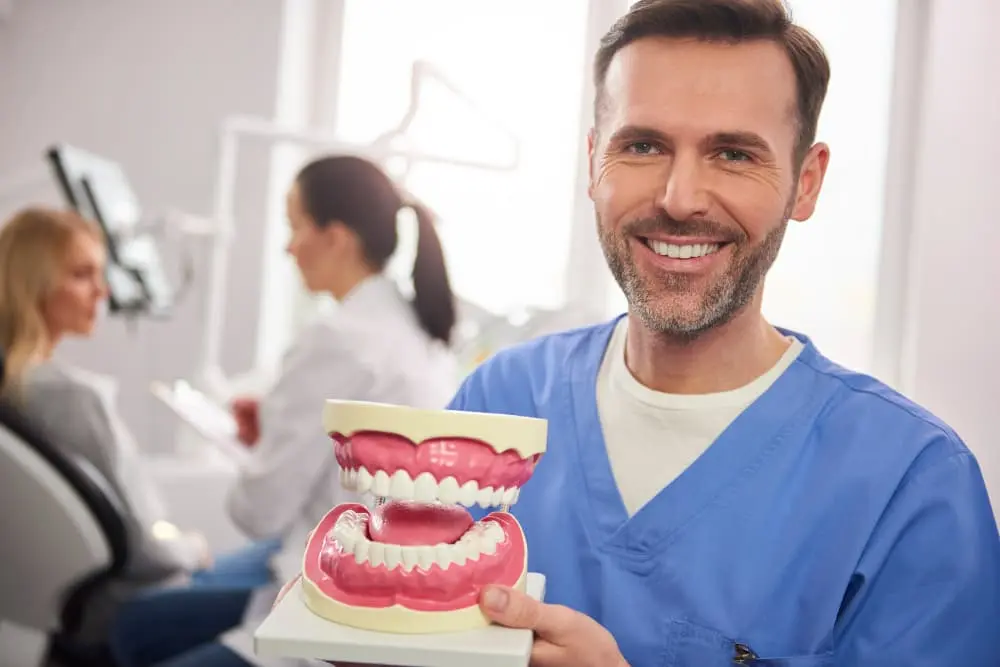 The Connection Between Oral Health and Overall Health03 Jan 2025
The Connection Between Oral Health and Overall Health03 Jan 2025
